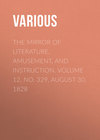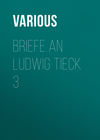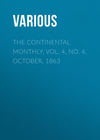Buch lesen: «The Mirror of Literature, Amusement, and Instruction. Volume 12, No. 329, August 30, 1828», Seite 3
LADIES' FASHIONS
(To the Editor of the Mirror.)
If you think the following observations conformable to the plan of your useful and entertaining publication, perhaps you may be induced to give them a place, or notice the subject I have in view, in some other way.
Notwithstanding the host of publications periodically issuing from the press, independent of the incalculable list of newspapers and reviews; and though the rage for periodicals is so great, that a single event will give rise to one, yet there does not appear to me to be any thing like those works which used to amuse and instruct our great grandfathers. I mean the "Spectator," "Tatler," and others, whose influence extends to the present day, and which are continually affording pleasure to cultivated minds by the soundness of their doctrines, aided by the extensive knowledge of human nature that the authors display throughout. But as they are now become standard works, they are not so capable of "shooting folly as it flies," and being as it were aged in the service, can only have a proper effect when folly will stand still to listen to them; but as that is, in most instances, out of the question, we want something more active, or in other words, something new; and novelty being the order of the day, attention is thereby excited, and the follies and extravagances of the "age," may possibly have some advantageous pruning.
Caricatures, whether exhibited in pantomimes or print shops, (though often got up for any other purpose than instruction) are not sufficient; they are too ridiculous, though sometimes not devoid of humour, instance the picture of a lady striving ineffectually to make a way through Temple Bar, but is prevented by the enormous size of her bonnet, which shows likewise that this extravagance in dress is not confined to the west end. But as these things are only laughed at, some other means ought to be adopted; and I should think myself extremely fortunate if I could be the humble means of inducing you, or your correspondents, to take the matter in hand.
Certainly not the least to be deprecated are the "ladies' present dresses;" the extravagances of which are not confined to the head, but are exhibited also all down the arm (not unaptly likened to series of balloons) and are also, in most instances, by some unusual "bustling," equally absurd. I wonder what would be said by Mr. Addison, were he to witness the present fashions. He would certainly think that all the care he took to keep the fair sex in order was in vain; and though enormous head dresses were not in vogue in his time, he seems to have anticipated that they would be, by his recommending the perusal of his 98th paper of the "Spectator" to his female readers by way of prevention, but which, alas! has not been studied with the attention it merits. Probably the transcription of one passage will not be misapplied here:—
He says, "I would desire the fair sex to consider how impossible it is for them to add any thing that can be ornamental to what is already the masterpiece of nature. The head has the most beautiful appearance, as well as the highest station, in a human figure. Nature has laid out all her art in beautifying the face; she has touched it with vermilion, planted in it a double row of ivory, made it the seat of smiles and blushes, lighted it up and enlivened it with the brightness of the eyes, hung it on each side with curious organs of sense, given it airs and graces that cannot be described, and surrounded it with such a flowing shade of hair as sets all its beauties in the most agreeable light. In short she seems to have designed the head as the cupola to the most glorious of her works; and when we load it with such a pile of supernumerary ornaments, we destroy the symmetry of the human figure, and foolishly contrive to call off the eye from great and real beauties to childish gew-gaws, ribbons, and bone-lace."
Womankind, Mr. Editor, I do not believe, are naturally vain; but as they were made for us and for our comfort, it is natural that they should endeavour to gain our esteem; but they carry their endeavours too far; by straining to excite attention they overstep the mark, become vain and coquetish, one strives to outdo another, others say they must do as other women do, and they thus make themselves ridiculous unknowingly. It is really painful to see a woman of sense and education become a slave to the tyranny of fashion—and injuring both body and mind—and it is, I think, an insult to a man of understanding to endeavour to excite his attention by any such peculiarities.
Having now generally stated the subject that I should wish to be taken up by abler hands than mine, I will conclude by recommending all your town-bred, and coquetish ladies to study and restudy a letter signed "Mary Home," in No. 254 of the excellent work before alluded to, "The Spectator." —H.M—. Great Surrey Street, Aug. 1828.
RETROSPECTIVE GLEANINGS
HISTORICAL ACCOUNT OF SMITHFIELD
(For the Mirror.)
Stowe, in his "Survey of London," 1633, says, "Then is Smithfield Pond, which of (old time) in records was called Horsepoole, for that men watered horses there, and was a great water. In the 6th of Henry V. a new building was made in the west part of Smithfield, betwixt the said poole and the river of Wels, or Turne-mill-brooke, in a place then called the Elms, for that there grew many elme-trees, and this had been the place of execution for offenders. Since the which time, the building there hath been so increased, that now remaineth not one tree growing. In the yeere 1357, the 31st of Edward III., great and royall justs were then holden in Smithfield, there being present the kings of England, France, and Scotland, with many other nobles, and great estates of divers lands. In the yeere 1362, the 36th of Edward III., on the first five daies of May, in Smithfield, were justs holden, the king and queene being present, with the most part of the chivalry of England and of France and of other nations; to which came Spaniards, Cyprians, and Armenians, knightly requesting ayde of the king of England against the Pagans, that invaded their confines. The 48th of Edward III., Dame Alice Perrers, or Pierce, (the king's concubine,) as lady of the Sunne, rode from the Tower of London through Cheape, accompanied of many lords and ladies, every lady leading a lord by his horse bridle, till they came into West Smithfield, and then began a great just, which endured seven daies after.—In the 14th of Richard II., royal justs and turnements were proclaimed to be done in Smithfield, to begin on Sunday next, after the feast of Saint Michael; many strangers came forth of other countries, namely, Valarian, Earle of St. Paul, that had married King Richard's sister, the Lady Maud Courtney; and William, the young Earle of Ostervant, son to Albert of Baviere, Earle of Holland and Henault. At the day appointed, there issued forth at the Tower, about the third houre of the day, 60 coursers, apparelled for the justs, upon every one an esquire of honour riding a soft pace; then came forth 60 ladies of honour, mounted upon palfraies, riding on the one side, richly apparelled, and every lady led a knight with a chain of gold; those knights, being on the king's party, had their armour and apparell garnished with white harts, and crownes of gold about the harts' neckes; and so they came riding through the streets of London to Smithfield, with a great number of trumpets, &c. The kinge and the queene, who were lodged in the bishop's palace of London, were come from thence, with many great estates, and placed in chambers, to see the justs. The ladies that led the knights were taken down from their palfraies, and went up to chambers prepared for them. Then alighted the esquires of honour from their coursers, and the knights in good order mounted upon them; and after their helmets were set on their heads, and being ready in all points, proclamation made by the heralds, the justs began, and many commendable courses were runne, to the great pleasure of the beholders. The justs continued many days with great feastings, as ye may reade in Froisard," &c. &c.
Smithfield, says Pennant, "was also the spot on which accusations were decided by duel, derived from the Kamp-fight ordeal of the Saxons. I will only (says Mr. P.) mention an instance. It was when the unfortunate armourer entered into the lists, on account of a false accusation of treason, brought against him by his apprentice, in the reign of Henry VI. The friends of the defendant had so plied him with liquor, that he fell an easy conquest to his accuser. Shakspeare has worked this piece of history into a scene, in the second part of Henry VI., but has made the poor armourer confess his treasons in his dying moments; for in the time in which this custom prevailed, it never was even suspected but that guilt must have been the portion of the vanquished. When people of rank fought with sword and lance, plebeian combatants were only allowed a pole, armed with a heavy sand-bag, with which they were to decide their guilt or innocence. In Smithfield were also held our autos-de-fee; but to the credit of our English monarchs, none were ever known to attend the ceremony. Even Philip II. of Spain never honoured any, of the many which were celebrated by permission of his gentle queen, with his presence, notwithstanding he could behold the roasting of his own subjects with infinite self-applause and sang-froid. The stone marks the spot, in this area, on which those cruel exhibitions were executed. Here our martyr Latimer preached patience to friar Forest, agonizing under the torture of a slow fire, for denying the king's supremacy; and to this place our martyr Cranmer compelled the amiable Edward, by forcing his reluctant hand to the warrant, to send Joan Bocher, a silly woman, to the stake. Yet Latimer never thought of his own conduct in his last moments; nor did Cranmer thrust his hand into the fire for a real crime, but for one which was venial, through the frailty of human nature. Our gracious Elizabeth could likewise burn people for religion. Two Dutchmen, Anabaptists, suffered in this place in 1675, and died, as Holinshed sagely remarks, with "roring and crieing." But let me say, (says Pennant,) that this was the only instance we have of her exerting the blessed prerogative of the writ De Haeretico comburendo. Her highness preferred the halter; her sullen sister faggot and fire. Not that we will deny but Elizabeth made a very free use of the terrible act of her 27th year. One hundred and sixty-eight suffered in her reign, at London, York, in Lancashire, and several other parts of the kingdom, convicted of being priests, of harbouring priests, or of becoming converts. But still there is a balance of 109 against us in the article persecution, and that by the agonizing death of fire; for the smallest number estimated to have suffered under the savage Mary, amounts, in her short reign, to 277. The last person who suffered at the stake in England was Bartholomew Logatt, who was burnt here in 1611, as a blasphemous heretic, according to the sentence pronounced by John King, bishop of London. The bishop consigned him to the secular of our monarch James, who took care to give the sentence full effect. This place, as well as Tybourn, was called The Elms, and used for the execution of malefactors even before the year 1219. In the year 1530, there was a most severe and singular punishment inflicted here on one John Roose, a cook, who had poisoned 17 persons of the Bishop of Rochester's family, two of whom died, and the rest never recovered their health. His design was against the pious prelate Fisher, who at that time resided at Rochesterplace, Lambeth. The villain was acquainted with the cook, and, coming into the bishop's kitchen, took an opportunity, while the cook's back was turned to fetch him some drink, to fling a great quantity of poison into the gruel, which was prepared for dinner for the bishop's family, and the poor of the parish. The good bishop escaped. Fortunately, he that day abstained from food. The humility and temperance of that good man are strongly marked in this relation, for he partook of the same ordinary food with the most wretched pauper. By a retrospective law, Roose was sentenced to be boiled to death, which was done accordingly. In Smithfield, the arch-rebel, Wat Tyler, met with, in 1381, the reward of his treason and insolence."
Smithfield3 is at present celebrated, and long since, for being the great market for cattle of all kinds, and likewise for being the place where Bartholomew fair is held, alias the Cockneys' Saturnalia, which was granted by Henry II. to the neighbouring priory.
P.T.W.




















